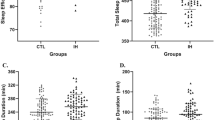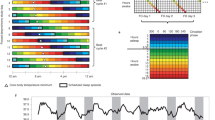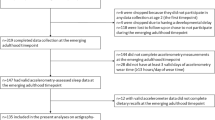Abstract
Olfaction can increase the drive to eat and may partially explain the consistent increases in energy intake (EI) following sleep restriction. We investigated the effects of 50% sleep restriction with altered sleep timing on olfactory performance. We also evaluated whether changes (Δ) in olfactory performance were associated with Δ24 h EI. Twelve men and six women (age: 23±4 years; BMI: 23±3 kg/m2) completed three randomized cross-over conditions: habitual sleep duration, 50% sleep restriction with advanced wake-time, and 50% sleep restriction with delayed bedtime. Sleep was measured in-laboratory (polysomnography). Olfactory performance (‘sniffin sticks’) and 24 h EI (food menu) were evaluated the next day. A trend for a significant condition*sex interaction was noted for threshold-discrimination-identification (TDI) scores (P=0.09); TDI scores were lowest in women and highest in men, following sleep restriction with advanced wake-time. Δolfactory performance were not associated with Δ24 h EI. The impact of sleep restriction on olfactory performance may differ between sexes. Changes in olfactory performance were not associated with changes in 24 h EI. Studies investigating prolonged effects of sleep loss on the relationship between olfactory performance with EI are needed.
This is a preview of subscription content, access via your institution
Access options
Subscribe to this journal
Receive 12 print issues and online access
$259.00 per year
only $21.58 per issue
Buy this article
- Purchase on SpringerLink
- Instant access to the full article PDF.
USD 39.95
Prices may be subject to local taxes which are calculated during checkout
Similar content being viewed by others
References
Critchley HD, Rolls ET . Hunger and satiety modify the responses of olfactory and visual neurons in the primate orbitofrontal cortex. J Neurophysiol 1996; 75: 1673–1686.
St-Onge MP, McReynolds A, Trivedi ZB, Roberts AL, Sy M, Hirsch J . Sleep restriction leads to increased activation of brain regions sensitive to food stimuli. Am J Clin Nutr 2012; 95: 818–824.
Benedict C, Brooks SJ, O'Daly OG, Almen MS, Morell A, Aberg K et al. Acute sleep deprivation enhances the brain's response to hedonic food stimuli: an fMRI study. J Clin Endocrinol Metab 2012; 97: E443–E447.
St-Onge MP, Shechter A . Sleep disturbances, body fat distribution, food intake and/or energy expenditure: pathophysiological aspects. Horm Mol Biol Clin Investig 2014; 17: 29–37.
Killgore WD, McBride SA . Odor identification accuracy declines following 24 h of sleep deprivation. J Sleep Res 2006; 15: 111–116.
McNeil J, Doucet E, Brunet JF, Hintze LJ, Chaumont I, Langlois E et al. The effects of sleep restriction and altered sleep timing on energy intake and energy expenditure. Physiol Behav 2016; 164 (Pt A), 157–163.
Cameron JD, Goldfield GS, Doucet E . Fasting for 24 h improves nasal chemosensory performance and food palatability in a related manner. Appetite 2012; 58: 978–981.
McNeil J, Riou ME, Razmjou S, Cadieux S, Doucet E . Reproducibility of a food menu to measure energy and macronutrient intakes in a laboratory and under real-life conditions. Br J Nutr 2012; 108: 1316–1324.
McCrickerd K, Forde CG . Sensory influences on food intake control: moving beyond palatability. Obes Rev 2016; 17: 18–29.
Markwald RR, Melanson EL, Smith MR, Higgins J, Perreault L, Eckel RH et al. Impact of insufficient sleep on total daily energy expenditure, food intake, and weight gain. Proc Natl Acad Sci USA 2013; 110: 5695–5700.
Renfro KJ, Hoffmann H . The relationship between oral contraceptive use and sensitivity to olfactory stimuli. Horm Behav 2013; 63: 491–496.
Acknowledgements
The authors thank the participants for their involvement in this study. The authors also thank Isabelle Chaumont, Émilie Langlois, Riley Maitland and Alexandre Riopel for their involvement in data collection. J McNeil was a recipient of the Ontario Graduate Scholarship during the time of data collection.
Author information
Authors and Affiliations
Corresponding author
Ethics declarations
Competing interests
The authors declare no conflict of interest.
Rights and permissions
About this article
Cite this article
McNeil, J., Forest, G., Hintze, L. et al. The effects of partial sleep restriction and altered sleep timing on olfactory performance. Eur J Clin Nutr 71, 1471–1472 (2017). https://doi.org/10.1038/ejcn.2017.109
Received:
Revised:
Accepted:
Published:
Issue date:
DOI: https://doi.org/10.1038/ejcn.2017.109



